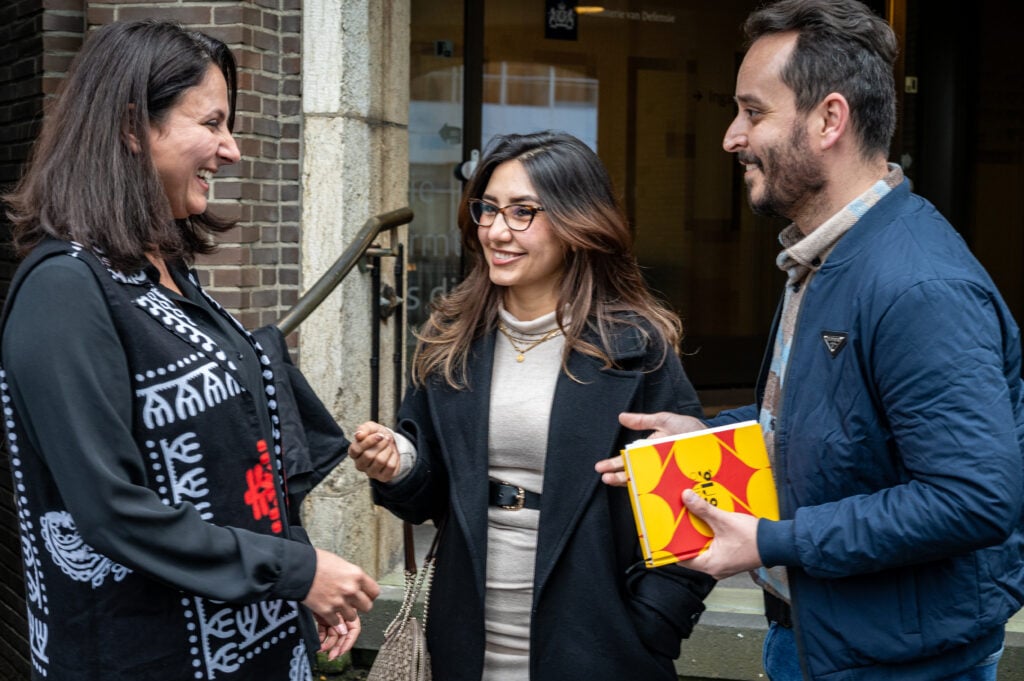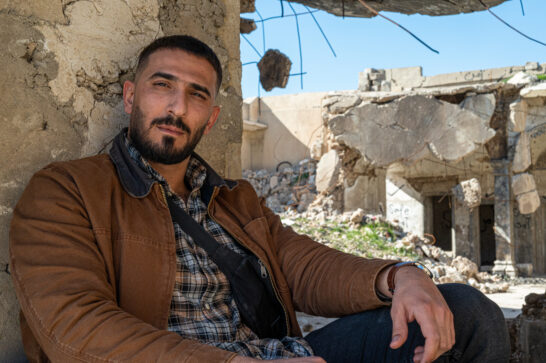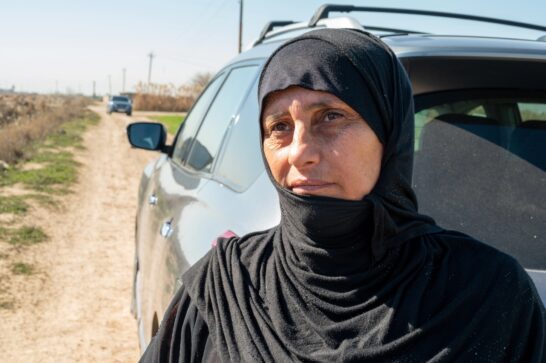As part of Cordaid’s Women’s Voices First programme, and to mark women’s month in March, a delegation of Iraqi human rights activists visited the Netherlands to engage with key stakeholders.
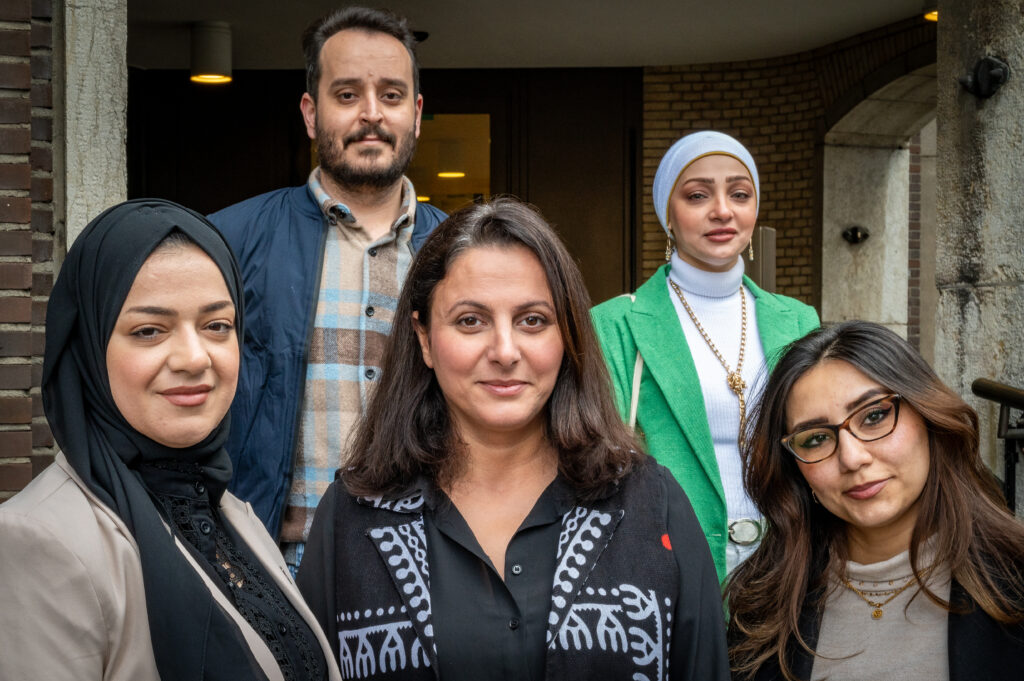
The delegation aimed to discuss Iraq’s current geopolitical and security concerns with Dutch parliamentarians, knowledge institutes, and civil society organisations active in Iraq. Cordaid spoke with Taban Shoresh (OBE), Hussein Jamal Malallah and Speda Hazim about their involvement in the Women’s Voices First programme and how storytelling informs their activism.
Iraq’s forgotten story
Despite its strategic location and importance for regional and global stability, Iraq no longer makes the headlines. Much like Afghanistan, this recovering crisis area isn’t ‘trending’. That’s why Taban, Hussein, Speda and the other delegates are on a mission to ensure that the world does not lose sight of the Iraqi context.
Something all the delegates have in common is their participation in the Women’s Voices First – Women Leading the Way to Inclusive Peace in Iraq programme. Funded by the British NAP 1325, the Canadian Embassy and the Conflict Stability and Security Fund, and implemented by Cordaid, the programme seeks to promote a localised and transformative Women, Peace and Security agenda
Without continued support for these organisations, everything that Iraqi civil society has spent years building could return to square one. And so, to continue strengthening Iraqi civic participation, these local actors invite us to listen to their stories and support their advocacy for a fundamental change in narrative.
Being a storyteller in Iraq
Speda Hazim is a Kurdish documentary filmmaker from Erbil. She was inspired to make films about her community in 2016 during her student interpretation job at the UN resettlement programme for survivors of ISIS atrocities: “Everyday I was hearing Yazidi girls’ stories about their capture. It was very, very traumatising and opened my eyes to what extremism could do.” This experience was Speda’s push to tell stories about the bravery of Iraq’s minority communities, and in particular, minority women.

After graduating, Speda freelanced for the BBC and VICE News and produced more character-led stories about girls returning from ISIS captivity as well as related mental health topics in her community. Lately, Speda’s focus has been on documenting the impact of climate change in Iraq, particularly on women.
She explains that, the increasing occurrences of drought which threatens people’s livelihoods, is in turn increasing the rate of child marriage: “when a family slips into poverty, the first thing they do is think of marrying off the daughters to be able to provide for the rest of the children.”
It’s easier to walk around with a gun than with the camera.
Indeed, the devastating impact of climate change upon Iraqi livelihoods is the subject of Speda’s award-winning documentary. After participating in a Cordaid-supported Through Her Lens film festival, she won first place. Speda’s seven-minute film No Choice But To Leave depicts the advocacy efforts of a female environmental journalist in Iraq, who tries to spur the government into taking action against climate-induced rural-to-urban migration.
Speda notes that there simply aren’t a lot of journalists in Iraq: “it’s easier to walk around with a gun than with the camera”. Part of the problem is that journalists always need permission from the authorities, which is only issued if they can determine where you are from and who you work for. And if you’re a freelancer like Speda? Everything becomes harder.
Speda therefore advises other aspiring journalists in Iraq or similar contexts to be aware of this bureaucratic environment as well as the prevalence of mis- and disinformation currently stoking division in Iraq. A combination of increased social media use and low media literacy and awareness levels makes communities more susceptible to divisive rhetoric and hate speech, especially when religion is weaponised.
However, storytelling can be utilised to address the tensions which endanger fragile peace processes across Iraq. Deploying the art of storytelling to rebuild trust within divided communities and to increase social cohesion is something that Hussein Malallah can attest to.
Strategic storytelling
Hussein is from the National Institute for Human Rights in Iraq and based in Kirkuk, one of the four disputed areas in the country (besides Diyala, Nano and Salahuddin). In his current work on transitional justice for divided communities in areas where ISIS has retreated (but traces of its ideology remain) Hussein is finding success in weaving evidence-based storytelling into project evaluations. He explains that, by collecting the stories of people working on transitional justice locally, two positive outcomes have proven possible: trust can be rebuilt at a community level, and inspiration can be found at the decision-making table.
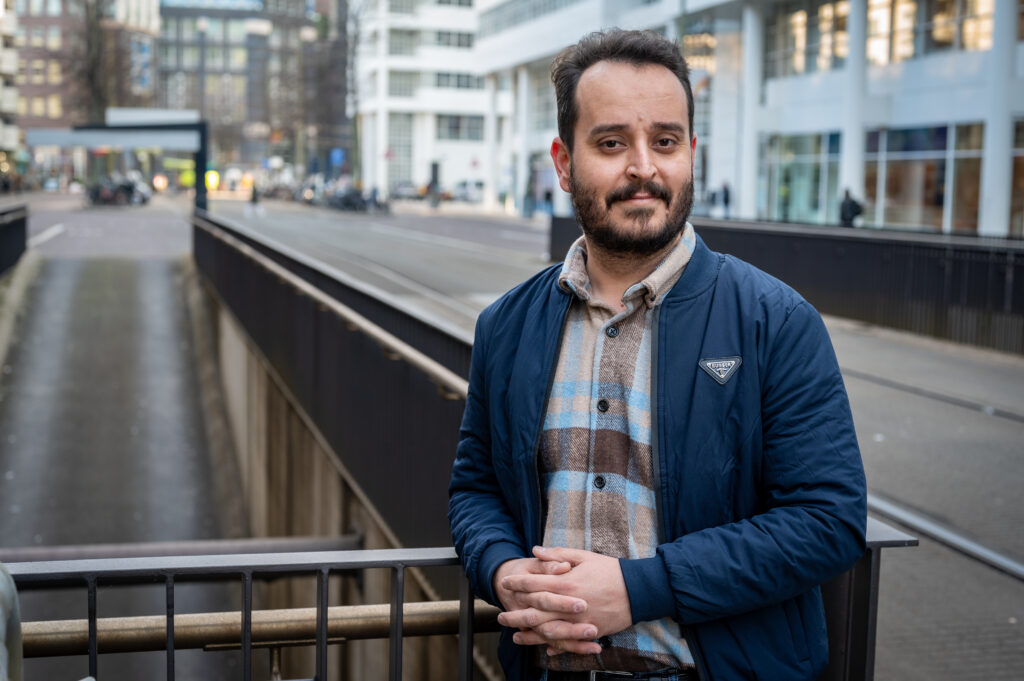
One of the biggest challenges Hussein has faced in his transitional justice work when addressing Iraq’s social division and segregation is preventing ‘revenge acts’. For communities and families either related to ISIS members or accused of affiliation, attacks are common. These acts can be carried out by individuals or institutions without evidence, and notably, have resulted in people being denied government-issued IDs.
Community stories are success stories.
This documentation is a necessity for all Iraqi citizens to move around the country’s large network of checkpoints and temporary control points; without documentation such as Iraq’s national card, life is extremely difficult. So in 2017, once he and his colleagues had the opportunity, they went to the mayor of the liberated areas of Hawija to advocate for a clear differentiation between real affiliation with ISIS and those who had been falsely accused.
In general, Hussein has approached advocacy as a mode of strategic storytelling: “Community stories are success stories. We have been using stories of positive change to strategically approach decision makers. By presenting local governments with stories from the ground, they can see how transitional justice is possible in the most fractured areas and this motivates them to support further transitional justice work.” Hussein says that some project stories have taken on multiple forms, from written articles to artistic interpretations; there are currently eight stories being developed into sketches by professional artists, and depending on the reception these sketches receive, Hussein hopes that the project will receive further government funding to erect a monument honouring the survivors of (inter-)communal conflicts.
Each part of it, each corner, has a different story. It’s basically very divided and segregated.
Given the complexity of Iraq’s context (which increases by the day), Hussein believes that this multiform approach to storytelling not only attracts donors and decision-makers but also better includes Iraq’s huge array of different communities. Speda agrees, but also views community-sensitive approaches as a storytelling strategy in itself. Due to the patchwork makeup of Iraq’s regions and ethnic groups, understanding each community’s priorities and differing sensitivities is a skill, and a crucial one if you’re a storyteller from Iraq. “Each part of it, each corner, has a different story. It’s basically very divided and segregated.”
Telling your own story
The first time Taban shared her personal story as a child genocide survivor was in April 2014 in the House of Lords. For that year’s Genocide Remembrance Day she stood before the UK Parliament’s upper chamber and recounted her family’s story of persecution at the hands of the Saddam Hussein regime. “It was the moment I realised that I should be doing something more connected to my history and my past.”
At that time, Taban was working in asset management in the city, and after going public with her remarkable story, she was seriously reconsidering her place in the corporate world. She reached out to her CEO for advice and his response was: “you’re too special for that corner desk. Can you please go and fly?” And that’s exactly what she did.
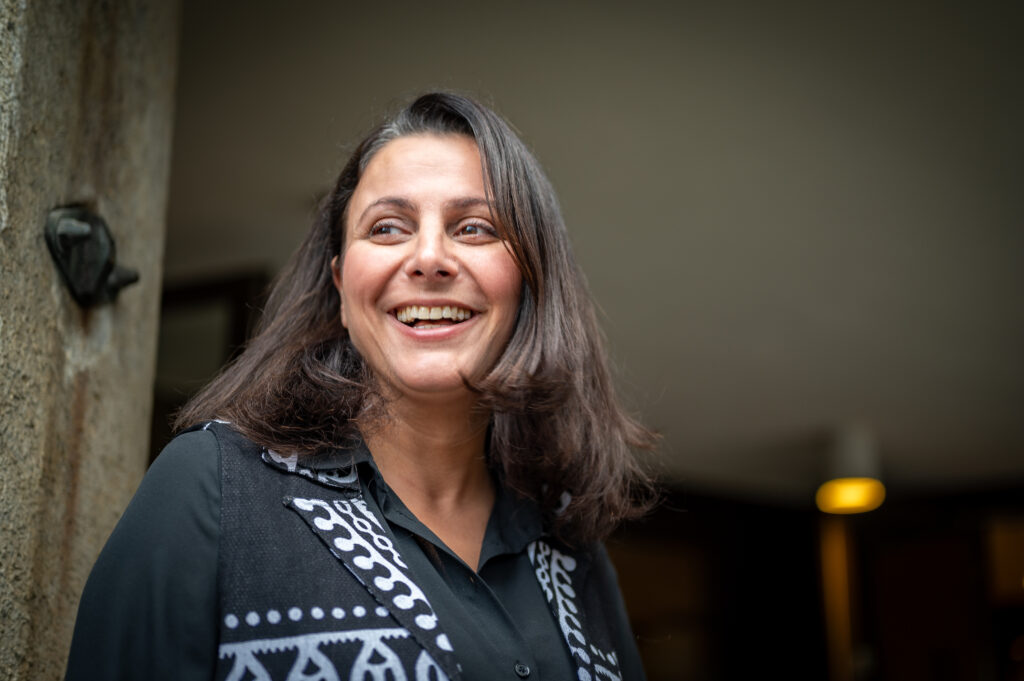
Not long after, Taban learned of the humanitarian crisis unfolding for the Yazidis who had fled ISIS attacks and were trapped on Mount Sinjar, Kurdistan. She joined the Rwanga Foundation’s aid distribution mission and found herself back in her homeland assisting another minority group now suffering violent persecution.
Taban believes that the awareness and PR surrounding the mission was crucial for getting the UK to push aid more through: “that made me realise the power of storytelling.” After 15 months in Kurdistan, Taban returned to the UK, but, she says, “there was no way that you could go back to a nine-to-five-corporate job when you’d experienced what I’d experienced.” And that’s when The Lotus Flower was born.
I knew that storytelling was going to be a big foundation of how to move it forward and I utilised my own personal lived experience to really help us push that narrative through.
The Lotus Flower is an NGO run by Kurdish-Iraqi women that provides safe community centres and programmes in refugee camps for women and girls to heal, learn and grow. Some of The Lotus Flower’s projects include their award-winning Women’s Business Incubator programme which provides financial grants, mentoring and training so that women in camps can start their own small businesses and earn incomes to support themselves and their families. To date, more than 90 women’s businesses have launched – including grocery shops, hair and beauty salons, clothing stores, cafés, stationery and photographic studios, as well as agricultural enterprises like beekeeping and sheep farming. Crucially, the women keep all profits for themselves, reinvesting as they see fit.
Other Lotus Flower projects to date have included Cyber Sisters, Peace Sisters and now Peace Brothers, all of which have been very successful in giving a platform to young people to engage, to be seen, and to advance women’s peace and security. Storytelling was and is central to both the conception and the continued impact of The Lotus Flower.
When Taban set up the organisation in her living room in London she had no money and no connections, but she knew exactly why she was doing it and who she was doing it for: “I knew that storytelling was going to be a big foundation of how to move it forward and I utilised my own personal lived experience to really help us push that narrative through.”
Although Taban used her personal journey to launch The Lotus Flower, she is also acutely aware that everyone’s story is unique. This is why The Lotus Flower invests heavily in ensuring that everyone has a platform to be able to be heard and be seen. Digital methods of storytelling play a pivotal role in this: “our social media and online presence is very strong in terms of storytelling.” The Lotus Flower use social media not only to highlight success stories, but also to convey the diverse realities and the lived situations for displaced women and girls. Storytelling is also a skill which has itself been taught to displaced women via The Lotus Flower programmes; for instance, one of the participants in the Storytelling Sisters programme is now a staff member who takes photos and videos for The Lotus Flower from within her camp.



